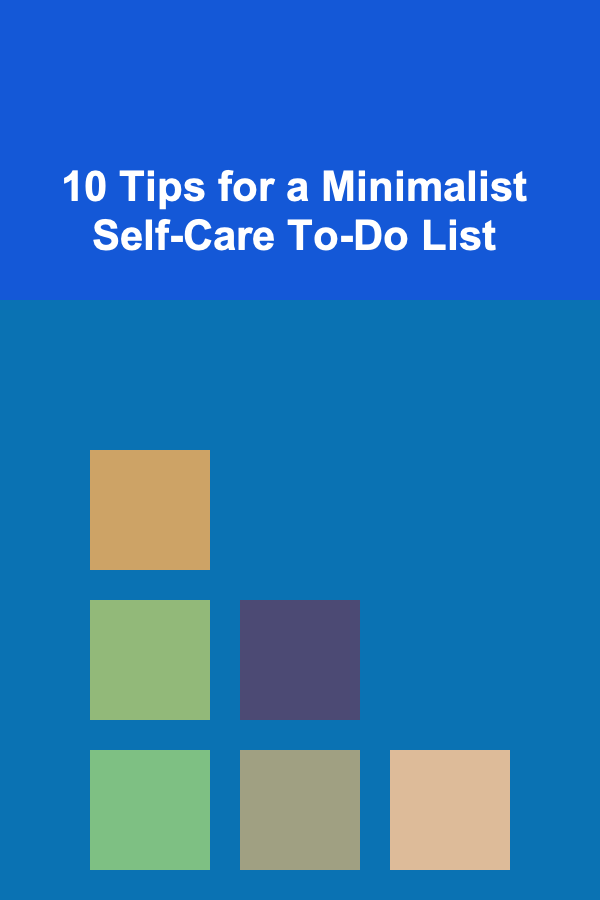
10 Tips for a Minimalist Self-Care To-Do List
ebook include PDF & Audio bundle (Micro Guide)
$12.99$10.99
Limited Time Offer! Order within the next:

In today's fast-paced world, it's easy to get caught up in the hustle and bustle of everyday life. With so many responsibilities and expectations, self-care often takes a backseat. The idea of self-care may seem overwhelming, with countless suggestions and products flooding the market. But what if you could take a minimalist approach to self-care---focusing on what truly matters, eliminating the noise, and finding simple, effective ways to recharge?
This article will provide you with 10 tips to create a minimalist self-care to-do list that will help you maintain balance, reduce stress, and prioritize your well-being in a sustainable way.
Prioritize Sleep Above All Else
The foundation of any self-care routine is sleep. Without sufficient rest, it's difficult to feel energized, focused, or emotionally balanced. Sleep is the cornerstone of good health, and prioritizing it should be at the top of your minimalist to-do list.
Why It's Important:
- Physical Health: Sleep is crucial for immune function, cell repair, and overall physical health.
- Mental Health: Lack of sleep can lead to mood swings, anxiety, and reduced cognitive function.
- Sustainable Energy: A good night's rest provides you with the energy you need to tackle your day with ease.
Actionable Tip:
Aim for 7-9 hours of sleep each night. Create a sleep-friendly environment by minimizing distractions, keeping your bedroom dark, and maintaining a consistent sleep schedule. If you're having trouble falling asleep, consider incorporating a bedtime ritual, such as reading, meditation, or deep breathing exercises.
Embrace Mindfulness and Meditation
Mindfulness is the practice of being fully present in the moment without judgment. Incorporating mindfulness into your daily routine can help reduce stress, increase self-awareness, and improve your mental well-being.
Why It's Important:
- Stress Reduction: Mindfulness and meditation are proven techniques for managing stress.
- Emotional Clarity: By being present, you can better understand your emotions and reactions, leading to improved emotional regulation.
- Focus and Productivity: Mindfulness can enhance your ability to focus, which can make you more productive in your daily tasks.
Actionable Tip:
Set aside just 5-10 minutes a day for mindfulness or meditation. You can use guided apps, like Headspace or Calm, or simply focus on your breath. Start small, and gradually increase the duration as it becomes a habit.
Simplify Your Skincare Routine
The beauty and skincare industry often promotes complex regimens with numerous products. However, a minimalist approach to skincare can be just as effective, if not more so, when it comes to taking care of your skin.
Why It's Important:
- Clarity and Consistency: A simplified routine reduces confusion and promotes consistent care, which is key to healthy skin.
- Avoid Overwhelm: A less complicated skincare routine helps prevent overwhelm and unnecessary purchases.
- Healthy Skin: Fewer products can mean fewer chemicals, which is better for sensitive skin.
Actionable Tip:
Opt for a basic skincare routine that includes a gentle cleanser, moisturizer, and sunscreen. You can add an exfoliator or treatment serum once or twice a week, depending on your skin's needs. Focus on products that suit your skin type and avoid overwhelming it with unnecessary ingredients.
Incorporate Movement, Not Exercise
Movement is an essential part of self-care, but it doesn't have to be confined to formal exercise sessions. Embrace a minimalist approach by focusing on incorporating natural movement into your day, without stressing over structured workouts.
Why It's Important:
- Energy Boost: Regular movement boosts energy and helps reduce feelings of fatigue.
- Flexibility and Strength: Even simple stretches and bodyweight exercises improve flexibility and strength.
- Stress Relief: Movement, even a short walk or stretching session, can help reduce stress and tension.
Actionable Tip:
Find ways to move throughout the day. This could include walking, stretching, or doing yoga. Choose activities that you enjoy and that make you feel good, rather than forcing yourself into a rigid fitness routine.
Declutter Your Physical Space
A cluttered environment can lead to a cluttered mind. Simplifying your living and working spaces is an essential self-care practice that can positively impact your mental clarity and emotional well-being.
Why It's Important:
- Mental Clarity: A tidy environment helps create a sense of calm and organization.
- Reduced Stress: Physical clutter can lead to emotional overload and stress.
- Enhanced Focus: A minimalist space helps you focus on what truly matters without distraction.
Actionable Tip:
Dedicate time each week to declutter your living space. Focus on one area at a time, such as your desk, closet, or kitchen. Remove items you no longer need and find a designated place for everything to promote a sense of order.
Set Boundaries and Say No
One of the most powerful ways to practice self-care is by setting boundaries with others and learning to say no. This allows you to protect your time and energy, ensuring you don't spread yourself too thin.
Why It's Important:
- Mental Health: Saying yes to everything can lead to burnout and resentment. Setting boundaries helps you prioritize your well-being.
- Energy Preservation: Boundaries prevent energy depletion by allowing you to focus on what truly matters to you.
- Respect: By saying no when necessary, you respect your own needs and teach others to do the same.
Actionable Tip:
Practice saying no to things that don't align with your values, priorities, or energy levels. Start by setting small boundaries in your personal and professional life, such as limiting the number of social events you attend or politely declining tasks that aren't a good fit.
Nourish Your Body with Whole Foods
A minimalist approach to nutrition involves focusing on simple, whole foods that nourish your body. Rather than following complicated diets or trendy food plans, stick to foods that provide essential nutrients and support overall health.
Why It's Important:
- Physical Health: Whole foods are rich in vitamins, minerals, and antioxidants that support your body's systems.
- Sustainable Eating: A minimalist approach to food is easier to maintain long-term than restrictive diets.
- Mental Clarity: A well-nourished body improves brain function and mental clarity.
Actionable Tip:
Focus on eating a variety of whole foods, including vegetables, fruits, lean proteins, and healthy fats. Minimize processed foods, and aim to prepare meals that are simple, fresh, and satisfying.
Engage in Meaningful Hobbies
In the minimalist approach to self-care, engaging in hobbies that bring you joy and fulfillment is essential. Whether it's painting, gardening, or reading, these activities can help you recharge and provide a sense of purpose outside of work and obligations.
Why It's Important:
- Creativity: Hobbies allow for creative expression, which can improve mood and mental well-being.
- Stress Relief: Engaging in a hobby you enjoy can serve as a mental escape, helping you unwind and relax.
- Personal Growth: Hobbies can expand your skills, knowledge, and personal growth in a non-pressured, enjoyable way.
Actionable Tip:
Set aside time each week to engage in a hobby that brings you joy. Whether it's learning a new instrument, cooking a new recipe, or doing a puzzle, make sure you're doing something that truly resonates with you.
Cultivate Social Connections with Intent
While it's important to maintain social connections, minimalist self-care suggests being intentional about the relationships you invest in. Focus on building meaningful connections that bring positivity into your life, rather than feeling obligated to maintain superficial or draining relationships.
Why It's Important:
- Support System: Meaningful relationships provide emotional support and a sense of belonging.
- Energy Exchange: Positive relationships are energizing, while toxic ones can drain your energy and cause stress.
- Personal Growth: Surrounding yourself with people who inspire and uplift you can contribute to your personal growth and well-being.
Actionable Tip:
Limit your social circle to people who bring out the best in you. Foster deep connections with a few close friends or family members, rather than spreading yourself too thin with countless acquaintances.
Practice Gratitude Daily
A minimalist self-care routine also involves nurturing a positive mindset. Practicing gratitude is one of the simplest and most effective ways to cultivate positivity and emotional resilience.
Why It's Important:
- Mental Health: Gratitude has been shown to improve mood, reduce stress, and increase overall happiness.
- Perspective: Gratitude helps shift your focus from what's lacking to what's abundant in your life.
- Emotional Resilience: Regularly practicing gratitude can help you cope with life's challenges in a more balanced way.
Actionable Tip:
Take a few moments each day to reflect on what you're grateful for. You can write it down in a journal or simply think about it in your mind. Focus on both big and small things, from the love of family to the beauty of nature.
Adopting a minimalist approach to self-care allows you to prioritize what truly matters and eliminate the unnecessary noise. By focusing on simple, sustainable practices that promote physical, mental, and emotional well-being, you can create a self-care routine that supports your long-term health and happiness. Remember, minimalism isn't about doing less; it's about doing what works best for you.
Reading More From Our Other Websites
- [Home Party Planning 101] How to Plan a Stress-Free Dinner Party at Home
- [Home Budget Decorating 101] How to Create a Gallery Wall on a Budget: Stylish Display Ideas
- [Home Soundproofing 101] How to Soundproof a Home Using Natural Materials
- [Organization Tip 101] How to Curate a Themed Antique Collection
- [Personal Investment 101] How to Build Wealth with a Long-Term Stock Investment Strategy
- [Personal Care Tips 101] How to Apply Hair Serum to Avoid Heavy, Greasy Hair
- [Organization Tip 101] How to Create an Inventory System for Your Collections
- [Trail Running Tip 101] The Science Behind Trail Running: Benefits for Heart Health, Muscles, and Mental Wellness
- [Organization Tip 101] How to Organize Your Measuring Cups and Spoons
- [Home Pet Care 101] How to Deal with a Cat's Aggressive Behavior

How to Build a Checklist for Continuous Improvement in Customer Onboarding
Read More
How to Create a Kids' Homework Zone at Home
Read More
How to Host a Charity Movie Night Fundraiser
Read More
How to Make Your Home More Comfortable During Winter Renovations
Read More
How to Rotate Your Collection Seasonally for Fresh Inspiration
Read More
10 Tips for Using Stickers in Bullet Journaling
Read MoreOther Products

How to Build a Checklist for Continuous Improvement in Customer Onboarding
Read More
How to Create a Kids' Homework Zone at Home
Read More
How to Host a Charity Movie Night Fundraiser
Read More
How to Make Your Home More Comfortable During Winter Renovations
Read More
How to Rotate Your Collection Seasonally for Fresh Inspiration
Read More